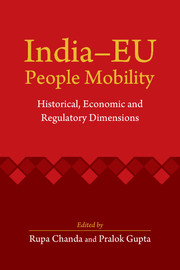Book contents
- Frontmatter
- Dedication
- Contents
- List of Tables, Figures and Boxes
- List of Abbreviations
- Preface
- Acknowledgements
- 1 India–EU People Mobility: Present Status and Policy Perspective
- 2 Economic Linkages and India–EU Mobility
- 3 Indian Diaspora in the EU
- 4 Goans in Portugal: History, Identity and Diaspora Linkages
- 5 Facilitating India–EU Mobility of IT Professionals
- 6 Movement of Indian Architects and Engineers: Prospects and Challenges in the EU
- 7 Mobility of Indian Legal Professionals to the EU: Understanding the EU's Regulatory Regime
- 8 Exploring India–EU Student Mobility
- 9 The Way Forward to a Strategic Engagement
- Contributors
- Index
4 - Goans in Portugal: History, Identity and Diaspora Linkages
Published online by Cambridge University Press: 05 January 2016
- Frontmatter
- Dedication
- Contents
- List of Tables, Figures and Boxes
- List of Abbreviations
- Preface
- Acknowledgements
- 1 India–EU People Mobility: Present Status and Policy Perspective
- 2 Economic Linkages and India–EU Mobility
- 3 Indian Diaspora in the EU
- 4 Goans in Portugal: History, Identity and Diaspora Linkages
- 5 Facilitating India–EU Mobility of IT Professionals
- 6 Movement of Indian Architects and Engineers: Prospects and Challenges in the EU
- 7 Mobility of Indian Legal Professionals to the EU: Understanding the EU's Regulatory Regime
- 8 Exploring India–EU Student Mobility
- 9 The Way Forward to a Strategic Engagement
- Contributors
- Index
Summary
Introduction
In today's world where competitiveness is shaped by the ability to integrate with world markets, a country's diaspora can play a very important role in facilitating trade and investment flows and in the transfer of technology, knowledge, ideas, talent and skills. Increasingly, developing economies are recognizing the significance of their expatriate population as a resource for their development, not only through their financial contributions but also through their role as a bridge to other countries for accessing knowledge and expertise and strengthening international relations. The relationship between a home country and its diaspora population is, however, a symbiotic one. It depends on the conditions and institutions provided by the home country to enable the engagement of and contribution by its expatriate community. It also depends on how the diaspora population identifies itself in connection with the host and home countries.
India has the second largest diaspora in the world, estimated at over 25 million and spread across all major regions. This community has been shaped by many waves of migration over the centuries. It is highly diverse in terms of culture, language, religion and social strata. Some of these diaspora groups, such as the Punjabis and the Gujaratis have been studied extensively, given their visible presence in trade and business and their continued strong cultural, economic, social and even political ties with their home states in India. The study of several other Indian diaspora groups, however, has been limited to scholars from that community based in India or abroad. One such relatively less studied Indian diaspora community is that of the Goans.
Goa, which was the centre of Portuguese rule in India, has seen a continuous flow of people to different parts of the world, including to Portugal and the Lusophone countries of Africa and Latin America. The Goan diaspora community presents an interesting case study as it provides a connection between India and the European mainland given the long historical relationship that existed between Portugal and the state of Goa. Portugal, a European country which has one of the largest numbers of people of Indian origin in continental Europe, has received scant attention in the context of studies on India–EU relations. The Goan diaspora connection with Portugal dates back to the Portuguese colonial era in India.
- Type
- Chapter
- Information
- India–EU People MobilityHistorical, Economic and Regulatory Dimensions, pp. 84 - 116Publisher: Cambridge University PressPrint publication year: 2015
- 1
- Cited by



